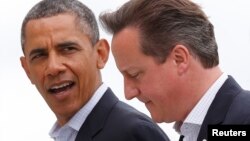U.S. President Barack Obama is defending the government's top-secret surveillance programs, while acknowledging widespread concerns the efforts are violating the privacy rights of ordinary Americans.
In a television interview broadcast late Monday on PBS, Obama insisted the National Security Agency is operating its phone and Internet monitoring efforts within the law.
The president has been under fire since last week's revelations of the NSA programs by the British newspaper The Guardian and The Washington Post. He says he has ordered intelligence officials to release as much information as possible "without further compromising the program."
Obama also said he has created a privacy and civil liberties oversight board to review the NSA efforts.
Earlier Monday, a report published in The Guardian said documents obtained from former U.S. intelligence contractor Edward Snowden, the man who exposed the NSA programs, show that Britain spied on diplomats attending the 2009 Group of 20 summit in London.
The newspaper said Britain's eavesdropping agency, the General Communications Headquarters or GCHQ, hacked into the phones and computers of Turkish and South African delegates at the summit. It said the GCHQ also tricked some G-20 delegates into using Internet cafes that it secretly modified to intercept diplomatic communications.
The Guardian published redacted versions of some of the documents, but their authenticity could not be immediately confirmed. Their release coincided with Britain hosting the first day of a Group of Eight industrialized nations summit in Northern Ireland.
Meanwhile, in a live online question and answer session hosted on The Guardian website, Snowden was quoted as saying U.S. intelligence analysts have the ability to view the content of U.S. citizen phone and e-mail communications without a warrant.
But Snowden did not mention any specific cases of U.S. intelligence operatives viewing private communications of Americans and did not give any examples of alleged rights abuses by those operatives.
Snowden has been hiding in the autonomous Chinese territory of Hong Kong since leaking the information about the NSA spying programs earlier this month. During the online session, he denied speculation that he had any contact with the Chinese government.
Some U.S. officials and lawmakers have accused Snowden of damaging national security by tipping off U.S. enemies about previously-secret surveillance programs and enabling them to change tactics.
In a television interview broadcast late Monday on PBS, Obama insisted the National Security Agency is operating its phone and Internet monitoring efforts within the law.
The president has been under fire since last week's revelations of the NSA programs by the British newspaper The Guardian and The Washington Post. He says he has ordered intelligence officials to release as much information as possible "without further compromising the program."
Obama also said he has created a privacy and civil liberties oversight board to review the NSA efforts.
Earlier Monday, a report published in The Guardian said documents obtained from former U.S. intelligence contractor Edward Snowden, the man who exposed the NSA programs, show that Britain spied on diplomats attending the 2009 Group of 20 summit in London.
The newspaper said Britain's eavesdropping agency, the General Communications Headquarters or GCHQ, hacked into the phones and computers of Turkish and South African delegates at the summit. It said the GCHQ also tricked some G-20 delegates into using Internet cafes that it secretly modified to intercept diplomatic communications.
The Guardian published redacted versions of some of the documents, but their authenticity could not be immediately confirmed. Their release coincided with Britain hosting the first day of a Group of Eight industrialized nations summit in Northern Ireland.
Meanwhile, in a live online question and answer session hosted on The Guardian website, Snowden was quoted as saying U.S. intelligence analysts have the ability to view the content of U.S. citizen phone and e-mail communications without a warrant.
But Snowden did not mention any specific cases of U.S. intelligence operatives viewing private communications of Americans and did not give any examples of alleged rights abuses by those operatives.
Snowden has been hiding in the autonomous Chinese territory of Hong Kong since leaking the information about the NSA spying programs earlier this month. During the online session, he denied speculation that he had any contact with the Chinese government.
Some U.S. officials and lawmakers have accused Snowden of damaging national security by tipping off U.S. enemies about previously-secret surveillance programs and enabling them to change tactics.






